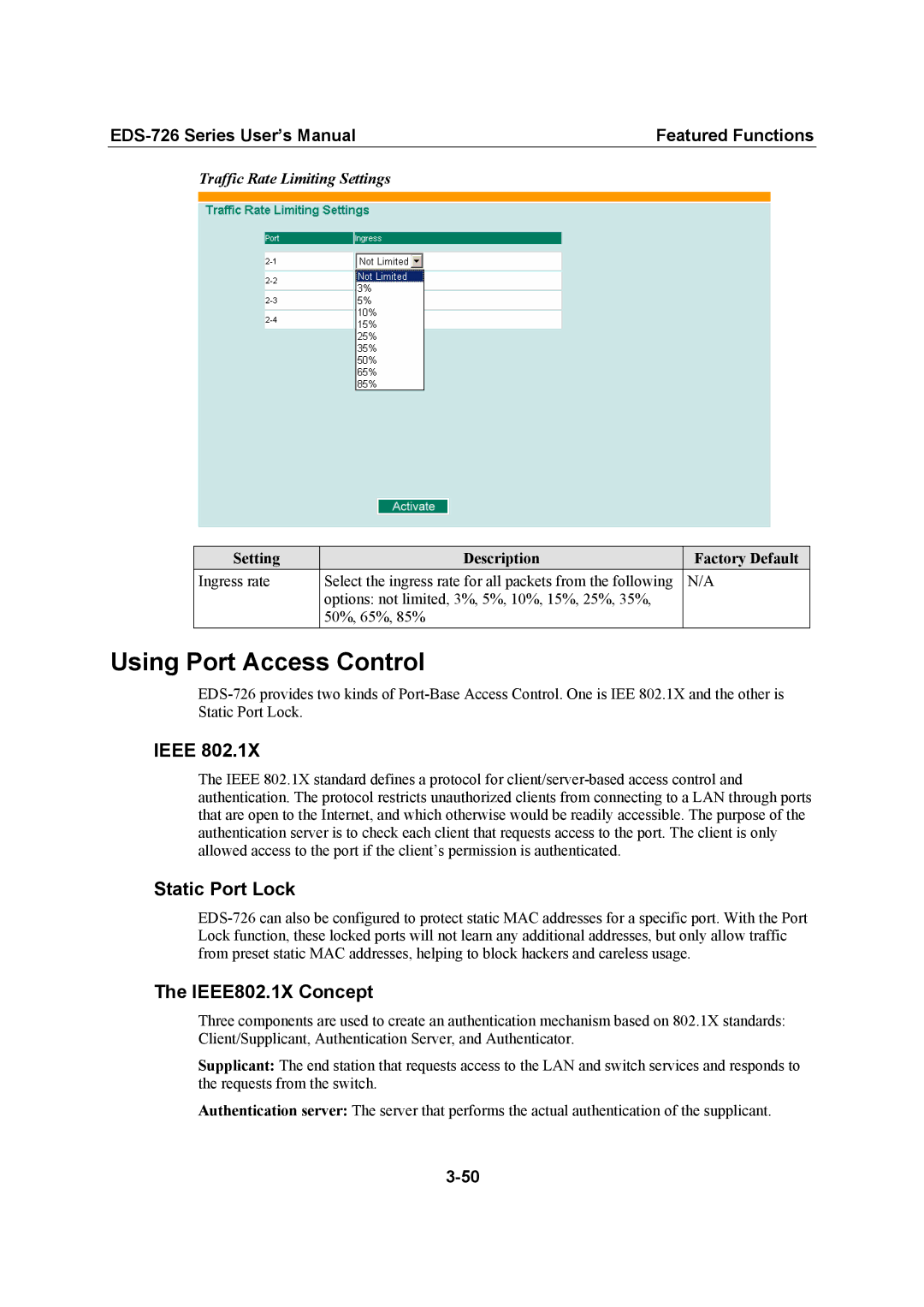First Edition, July
Moxa EtherDevice Switch EDS-726 Series User’s Manual
Disclaimer
Copyright Notice
Trademarks
Table of Contents
Chapter EDS Configurator GUI
Introduction
Features
Package Checklist
Overview
Industrial Networking Capability
Recommended Software and Accessories
Useful Utility and Remote Configuration
Getting Started
Connection Caution
RS-232 Console Configuration 115200, None, 8, 1, VT100
EDS-726 Series User’s Manual
Key Function
Configuration by Telnet Console
Configuration by Web Browser
EDS-726 Series User’s Manual
Disabling Telnet and Browser Access
Featured Functions
System Identification
Configuring Basic Settings
Switch Name
Password
Switch Location
Switch Description
Account
Password
Any host on a specific subnetwork can access the EDS-726
Accessible IP
Any host can access the EDS-726
Allowable Hosts Input format
Port
Enable
Description
Name
Port Transmission Speed
Network
FDX Flow Control
Port Type
Switch IP Address
Auto IP Configuration
Switch Subnet Mask
Default Gateway
Current Time
Time
Current Date
System Up Time
System File Update-By Remote Tftp
System File Update-By Local Import/Export
Factory Default
Using Port Trunking
System File Update-By CF Card
Port Trunking Concept
Configuring Port Trunking
Trunk Group Maximum of 4 trunk groups
Setting Description
Trunk Type
Member Ports/Available Ports
Snmp
Configuring Snmp
Snmp Versions
Snmp Read/Write Settings
V1, V2c Read Community
V1, V2c Write/Read Community
Trap Server IP/Name
Trap Settings
Switch Object ID
Using Communication Redundancy
Private MIB information
Gigabit Ethernet Redundant Ring Capability 300 ms
Turbo Ring Concept
Initial Setup
When the number of EDS-726 units in the Turbo Ring is even
Ring Coupling
Configuring Turbo Ring
STP/RSTP Concept
What is STP?
Port Speed Path Cost 802.1D Edition 802.1w-2001
How STP Works
STP Requirements
STP Reconfiguration
STP Configuration
Differences between Rstp and STP
STP Calculation
STP Example
Using STP on a Network with Multiple VLANs
Configuring STP/RSTP
Root/Not Root
Forwarding Delay
Protocol of Redundancy
Bridge priority
Enable STP per Port
Configuration Limits of RSTP/STP
Port Priority
Port Cost
What is Traffic Prioritization?
Using Traffic Prioritization
Traffic Prioritization Concept
How Traffic Prioritization Works
Traffic Prioritization
Differentiated Services DiffServ Traffic Marking
Ieee 802.1p Priority Level Ieee 802.1D Traffic Type
Traffic Queues
Configuring Traffic Prioritization
QoS Classification
Queuing Mechanism
Default Port Priority
Inspect TOS
Inspect COS
TOS/DiffServ Mapping
Setting Description Factory
CoS Mapping
Virtual LAN Vlan Concept
Using Virtual LAN
What is a VLAN?
Benefits of VLANs
VLANs and Moxa EtherDevice Switch
Managing a Vlan
Communication Between VLANs
HUB
Sample Applications of VLANs using Moxa EDS-726
Vlan Port Settings
Configuring 802.1Q Vlan
Port Pvid
Management Vlan ID
Port Fixed Vlan List Tagged
Port Forbidden Vlan List
What is an IP Multicast?
Using Multicast Filtering
Concept of Multicast Filtering
Benefits of Multicast
Network without multicast filtering
Multicast Filtering
Igmp Internet Group Management Protocol Snooping Mode
Multicast Filtering and Moxa EtherDevice Switch
Query Mode
Igmp Multicast Filtering
Igmp Snooping Settings
Configuring Igmp Snooping
Static Multicast MAC
Enabling Multicast Filtering
Static Multicast Router Port
Igmp Snooping
Querier
Igmp Table
Add New Static Multicast Address to the List
Add Static Multicast MAC
None
Join Port
Port Setting Description Factory Default
Configuring Gmrp
Gmrp enable Setting Description Factory Default
Port Mode Setting Description Factory Default
Configuring Bandwidth Management
Using Bandwidth Management
Gmrp Table
Broadcast Storm Protection
Traffic Rate Limiting Settings
Using Port Access Control
Ieee
Static Port Lock
Message Exchange
802.1X
Configuring Ieee
Radius Server
Database Option
Server Port
Shared Key
802.1X Re-Authentication
802.1X Re-Authentication
Local User Database Setup
802.1X Table
Local User Database Setup
Static Port Lock
Email Alarm Events Settings
Using Auto Warning
Configuring Email Warning
Event Types
MoxaEtherDeviceSwitch0001@SwitchLocation
System Event
Port Event
Email Settings
Relay Alarm Events Settings
Configuring Relay Warning
Configuring Relay Event Types
Activate your settings
Override relay alarm settings
Relay Alarm List
Using Set Device IP
Using Line-Swap-Fast-Recovery
Configuring Line-Swap Fast Recovery
Enable Line-Swap-Fast-Recovery
Set up the connected devices
Configuring Set Device IP
Mirror Port
Using Diagnosis
Output data stream
Bi-directional
Ping
Using Monitor
Monitor by Switch
Monitor by Port
Using the MAC Address Table
ALL
Using Event Log
EDS Configurator GUI
Broadcast Search
Starting EDS Configurator
Search by IP address
Upgrade Firmware
Modify IP Address
Export Configuration
Import Configuration
Unlock Server
EDS-726 Series User’s Manual
MIB II.2 Interfaces Group
MIB II.1 System Group
MIB II.4 IP Group
MIB II.5 Icmp Group
MIB II.17 dot1dBridge Group
MIB II.10 Transmission Group
MIB II.11 Snmp Group
Private Traps
Public Traps
Interface
Modular Managed Switch System, EDS-72610G
Mechanical
Power
Gigabit Ethernet Interface Module, IM series
Optical Fiber
Fast Ethernet Interface Module, IM series
Interface
Regulatory Approvals
Environmental
Service Information
Following services are provided
Moxa Internet Services
Serial Number
Problem Report Form
Product Return Procedure

